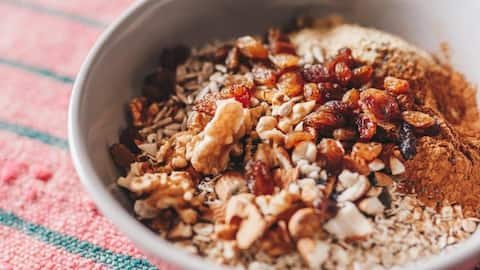Overnight oats: A spoonful of health boost
What's the story
While the classic methods of preparing oats offer various options, the current sensation in the breakfast trend is the rise of "overnight oats," which has been captivating Instagram feeds with its picturesque presentations. It is truly a feast for the eyes. Let's delve into the benefits of overnight oats, exploring what sets them apart, and whether they outshine your regular bowl of oats.
Explainer
What is meant by overnight oats?
Overnight oats signify oats soaked in water, milk, or yogurt for five-seven hours or overnight. This process transforms them into a luscious pudding, offering a creamy texture that can be enhanced with the addition of fruits, chia seeds, dry fruits, nuts, and various other wholesome ingredients. This imparts a delectable flavor and elevates the health quotient, making it a super-healthy and convenient breakfast option.
Benefits
Weight management
Beyond their reputation as a nutritious and convenient breakfast option, overnight oats can play a role in supporting weight loss. The inclusion of beta-glucan in oats contributes to a sense of fullness, preventing overeating and aiding in weight management. Additionally, due to their high fiber content and low glycemic index, oats help regulate blood sugar levels.
Immunity
Boosts immunity
Indulging in a bowl of overnight oats can potentially contribute to fortifying your immune system. The presence of beta-glucan in oats plays a crucial role in enhancing the activity of white blood cells (WBCs), which form a critical part of our body's defense against illnesses and expedite the healing process of wounds adds another layer to the immune-boosting benefits of overnight oats.
Cooked vs soaked
Cooked or soaked?
In terms of flavor, cooked oats typically boast a creamier consistency, a preference for some individuals. One advantage of overnight oats lies in their higher content of resistant starch compared to cooked oats. Resistant starch, a type of carbohydrate resistant to digestion in the small intestine, undergoes fermentation in the large intestine, acting as a prebiotic,contributing to improved gut health.
Soaked cons
Drawback of soaked oats
Raw oats contain elevated levels of phytic acid, an anti-nutrient that binds with minerals such as iron, zinc, and calcium, hindering their absorption. In contrast, cooked oats exhibit lower concentrations of phytic acid, as the cooking process effectively breaks down this compound, contributing to improved mineral absorption. This makes cooked oats a favorable option for those seeking enhanced nutrient assimilation.
